Nablus 7 September 2004
Reproduced below is the testimony of a soldier in the Israeli Defence Forces (IDF) serving in Nablus. The transcript comes from a trusted Israeli friend actively involved in the ‘refusenik’ movement who has given permission to reproduce and distribute this text with the names of those involved omitted.
In recent months, a particularly dedicated group of soldiers has been actively engaged in gathering the testimonies of Israeli soldiers about human rights abuses perpetrated against Palestinian civilians by IDF units enforcing the illegal military occupation of the West Bank and Gaza Strip.
The interview is unedited except for the addition of section headings. The omissions in the text were left as discovered while editing the English version of the text of the Hebrew language interview.
Some of the claims herein are shocking. I honestly hope that the interview - originally conducted in Hebrew - will impel people to action and that the commanders responsible for such abuses will be held to account. It is worth remembering that the soldier’s unit was ‘exemplary’ in that it was considered to be one that had relatively good discipline compared to other fighting units in the IDF.
The interview is thus testimony to the real nature of a military force that is often portrayed as ‘the most moral army in the world.’ After reading this interview, it is hard to understand how such a mythology can be sustained within the Israeli body-politic and in the mainstream of US public opinion.
CHECKPOINTS
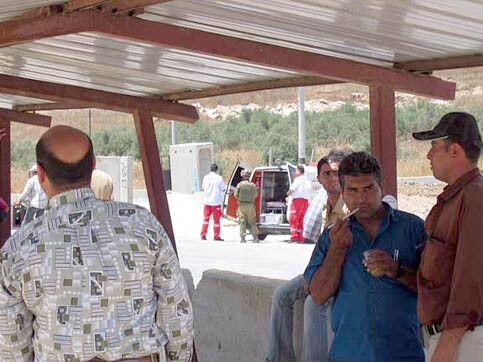
Medical Teams Detained at Huwara Checkpoint Near Nablus (Photo by Phil)
Israeli soldier: I go up to the checkpoint, and there is some garbage there, and suddenly a squad commander who is only 20 stops everything, and says that until all the drivers (who are 50 year olds) come here to clean the checkpoint, no one passes.
Interviewer:: What was dirty about the checkpoint?
Israeli soldier: Their garbage, but not just theirs.
Interviewer: What, the soldier posts?
Israeli soldier: No, not the posts, but yes, between the cement blocks. Not the guard post, but between the cement blocks.
Interviewer: Empty snack packages…
Israeli soldier: They [Palestinians] cannot choose what to pick up, and until they clean everything here, no one passes. Meanwhile, a queue is formed, of around …
Interviewer: And a squad commander decides all that.
Israeli soldier: At a checkpoint, a squad commander is king. As long as there is no inspection by the regiment commander or that, he does not…
Interviewer: And if the regiment commander shows up and sees a giant queue?
Israeli soldier: He does not ask. For him, it is legitimate to have a giant queue at a back to back checkpoint.
[Translator’s note: a back to back checkpoint - a checkpoint where goods are transferred from trucks on one side to trucks on the other side]
Interviewer: And this is a regiment commander inspection?
Israeli soldier: Such an inspection does not really help. He moves around the area. He doesn’t…
Interviewer: And if a regiment commander shows up and sees that a squad commander stopped all traffic in order for the Palestinians to clean the checkpoint?
Israeli soldier: I doubt he’ll say anything.
Interviewer: Did he see anything like this?
Israeli soldier: I don’t remember but it’s not something that serious.
ORDERS TO SHOOT
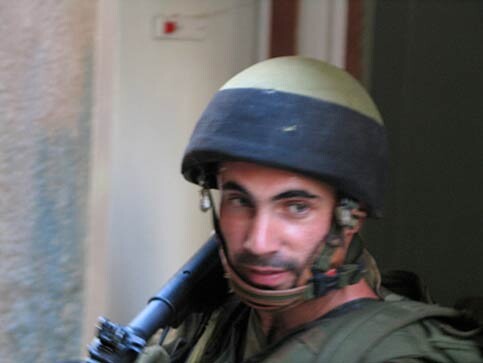
IDF Soldier During House-to-House Searches in El-Ein Refugee Camp (Photo by Giampiero)
Israeli soldier: “Tazpitanim” is when you are in the “Straw Widow” procedure and there is plenty of [military] traffic inside the city, so the sniper positions on the roofs identify people who are holding cellphones and reporting where the vehicles are heading and all that. These are people who sort of have…they’re not completely innocent…but they’re not exactly…
Interviewer: I am asking because in Hebron it wasn’t like that.
Israeli soldier: No? Because in Balata [a Palestinian refugee camp, near Nablus] they also have authorization to shoot. You shoot them in the legs. The scouts. A person standing on a roof with a cellphone during activity or something like that and the snipers see him looking down at least twice, something like that, looks a bit suspicious, you ask the regiment commander for permission to shoot such a person in the legs.
Interviewer: You ask for permission? Are there cases in which you don’t ask for permission?
Israeli soldier: No.
Interviewer: It’s enough to see him talking on the cellphone?
Israeli soldier: It’s enough to see him talking on the cellphone and looking down.
Interviewer: You shoot only at his legs. What if you can’t see his legs?
Israeli soldier: I can’t believe it is… but sometimes you do miss. You miss the legs and hit him above the legs: in the belly.
100 SHEKEL FINE FOR KILLING A KID, NO TRIALS/INQUIRIES
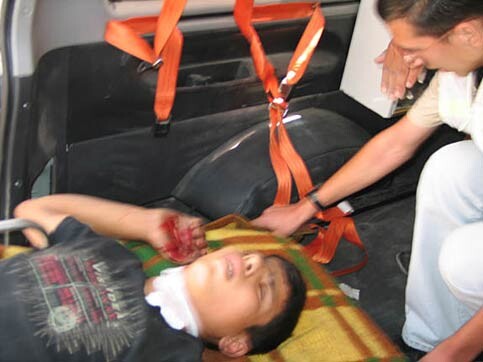
Boy shot in the neck during IDF operation in Nablus (Photo by Giampiero)
Interviewer: Do you know guys who did this?
Israeli soldier: Hmm…not on purpose, but we did have cases in the city in which kids were killed, not necessarily scouts…as a result of trying to hit them in the legs, but they were hit in the back, in their belly…the consequence is that…you get punished. So usually an officer gets fined 100 shekels for killing a child and…
[Translator’s note: From my experience, most of the shooting I’ve witnessed in the past nine months of those killed or critically injured was to the head or upper portions of the body.]
Interviewer: What?! I don’t know about this.
Israeli soldier: Yes.
Interviewer: I want to understand this: if I aim at the legs and hit the child instead in the…
Israeli soldier: No , no, no. If we enter the city in a vehicular patrol or something, on an Abir [Translator’s note: An armored Israeli military vehicle], and stones are thrown at us and all that, you will not get permission. But if you see a kid throwing a brick at you, you can shoot him in the legs.
Interviewer: He throws this at the Abir?
Israeli soldier: Yes
Interviewer: Is the Abir armored?
Israeli soldier: Absolutely. We were shot at, they threw everything at us, and nothing happened. But in the case of bricks you can shoot at the legs with permission from a captain.
Interviewer: The officer at the scene?
Israeli soldier: No, no. From the commander inside the Abir. Not 08 [Translator’s note: an IDF term for an officer]. This is usually a permit from the company commander. The one who shoots if I’m on my way to an arrest or in a “Livnat shibush” procedure.
Interviewer: What is “Livnat Shibush”?
Israeli soldier: It’s when you have a specific alert that there’s going to be a transfer of weapons inside the city, inside Balata…if someone wants out, so they focus attention at us, we just drive a lot, make a commotion inside the city, throw a lot of stun grenades, lots of gas, just to give the impression that there’s a large force, and make them scared of getting out. The idea is to make them come out to us and cause riots. When there are riots, you get permission to shoot at the legs of kids who throw bricks, and if I happen to shoot, and I’m just a shooter [not a sniper], and I aim at the knee…
Interviewer: Can any soldier shoot?
Israeli soldier: Yes, from his personal weapon. If the commander during the procedure is a deputy company commander, he can authorize this. And if by mistake I hit him in the back or kill him, and we had this…2-3 times just in the last service term in Nablus.
Interviewer: Soldiers killed kids.
Israeli soldier: Killed kids by mistake.
Interviewer: Aimed at the legs, shot them in the back and killed them. How do you know afterwards if soldiers killed them?
Israeli soldier: …Reports arrive from the DCO [Translator’s note: District Coordination Office], the Palestinians report, there is cooperation in that sense. So kids get killed. It’s nothing to a soldier. And an officer can get [fined] for this hundred, two-hundred shekels.
Interviewer: 100, 200 shekels for a kid?
Israeli soldier: Yes.
Interviewer: Prison?
Israeli soldier: No, No.
Interviewer: A trial ? Any serious inquiry about this thing?
Israeli soldier: …No. I’m sure it doesn’t go above the regiment commander. I don’t know about people undergoing an inquiry. I can’t say for sure…but I didn’t see people undergoing an inquiry and I know nothing was done with it later.
USE OF DEMONSTRATION DISPERSION EQUIPMENT - BEHAVING LIKE ‘RETARDED KIDS’
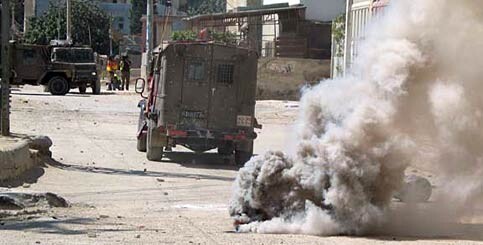
Teargas deployed by IDF in Balata Refugee Camp (Photo by Giampiero)
Israeli soldier: Someone comes to the alert squad: “Let’s go guys, there’s a Livnat Shibush. “Why, what happened?” “There’s an attempt to swap weapons in Balata.” What do we do? Go around Balata and we can use the demonstration dispersion equipment, 2 stun grenades…
Interviewer: Any restriction on the use of this equipment?
Israeli soldier: None. You can be there with 4 stun grenades on you. We have a box of equipment inside the Abir and everyone can use as much as they want. How many rounds of gas does the 08 shoot? As many as he wants. No restrictions.
Interviewer: In any such vehicle there’s a 08… He says where to shoot…
Israeli soldier: No, he sits with the driver in the front, we sit in the back. “Listen Erez, there are some kids here I’m throwing at them.” “Very well, chief this is 2A, the demonstration dispersion equipment is OK.”
“Check, got you.” You throw stun grenades, you throw gas. No authorization needed, no nothing.
“Erez, I’m throwing gas,” and this comes to a point when people behave like little kids: “Let me throw gas, let me throw gas.”
Interviewer: Do you say anything about this?
Israeli soldier: Yes, in the company I’m in the minority. In a platoon of 9 people, we were 3 against behaving like retarded kids every time you enter the city and throw stun grenades like…
Interviewer: What do you mean by “retarded kids”?
Israeli soldier: It’s when they throw stones at you, while you’re in an armored Abir, and you know nothing can happen to you. So there’s no need to throw stun grenades at them, making them deaf for a month.
Interviewer: The orders are to throw stun grenades at them?
Israeli soldier: There aren’t any defined orders. If there are defined orders then nobody knows them. Use of demonstration dispersion equipment - no one has ever told us anything about it. Inside the city, inside Nablus.
Interviewer: Inside Nablus, you go in - you can do anything you want? With rubber bullets ?
Israeli soldier: Rubber, yes.
Interviewer: Anything.
Israeli soldier: Yes, anything. Maybe you have to report on the communication radio about rubber shooting. I never heard anyone say “no.” No matter what. 4 soldiers in the back, the commander in the front, he has no idea what’s going on.
Interviewer: Can you tell him “I saw something - I’m gonna shoot”?
Israeli soldier: As long as it’s not live bullets - anything.
Interviewer: Have you guys ever shot rubber too?
Israeli soldier: Yes, sure.
Interviewer: On what.
Israeli soldier: I myself never shot rubber, but if we’re really getting dismantled, and I see that they’re standing on the roofs and throwing refrigerators and almost breaking the Abir, we shoot rubber or live bullets in the air.
Interviewer: Where do you aim rubber bullets?
Israeli soldier: The lower part of the body.
THE FIRST SERVICE TERM, OCTOBER 2002
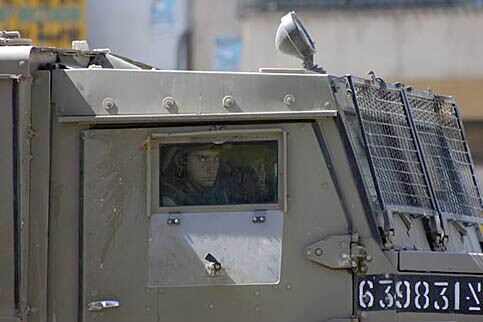
IDF soldier in an armored vehicle patrolling the streets of Nablus (Photo by Neil)
Interviewer: And do you ever hit?
Israeli soldier: I don’t know. I didn’t see it hit, this thing. I didn’t get to shoot this. But in the beginning, in the first service term we had, when we were part of the regiment, sitting inside the city, it was …
Interviewer: When was that?
Israeli soldier: October 2002. Two years to the Intifada. Something like 4-5 months after operation “Defensive Shield”. We would seize an abandoned house in order to prevent villagers from entering…That was one of the missions and there was another mission with an APC, imposing curfew, going around wherever you like. 08 commands this. Destroying their streets like this…
Interviewer: What do you mean destroying their streets?
Israeli soldier: The APC drives on it and destroys the streets.
Interviewer: What, with cars and such things?
Israeli soldier: Sometimes they went for it and sometimes they wouldn’t. Sometimes you drive over cars and sometimes…
Interviewer: Military necessity?
Israeli soldier: No, no military necessity.
Interviewer: No, I mean, if you want to enter some place and a car is in the way, then we have a military necessity.
Israeli soldier: No, no, by mistake… you cannot see the place is too narrow… at that time we could do whatever we wanted. We would shoot, we would stand at the blocking point, the abandoned house, and you could see people from 1 km or 500-600 metres ahead before they arrive, and you don’t have the energy to speak with them and kick them back. So you try to push them back, so that they won’t come near at all. So what do you do? Shoot near them.
Interviewer: Live ammunition?
Israeli soldier: Live ammunition. Back then we would use only live ammunition. We were inside the city, you would shoot at whatever you wanted. We would shoot at streetlights…you would shoot near this…you would shoot to deter, in the air, you didn’t need authorization from someone higher than a 08, nothing. They would ask you on the communication radio, the company, the regiment. You would say “I did it - OK.” No one would ask why, no one would ask anything. At some stage we were inside the Hummers, shielded Hummers. We would impose curfew in a city where no one really obeys you when there is curfew. We would crash into live cars…
CRASHING INTO LIVE CARS, BEATING MOTORISTS
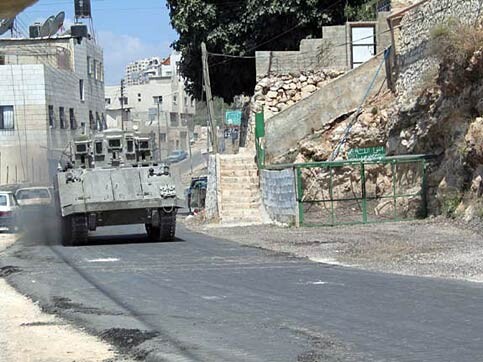
APC enforcing curfew in Nablus (Photo by Giampiero)
Interviewer: I didn’t get this.
Israeli soldier: You…cars go by, and then the driver sees you, realizes that they have to get, that they cannot drive, so they they start going in reverse, and you go faster, so you go over them, with a shielded Hummer, crash into it.
Interviewer: Did it happen to you, in your Hummer?
Israeli soldier: I was in a Hummer when this happened.
Interviewer: How many times?
Israeli soldier: I, specifically - once. And other than the sergeant who was with me in the Hummer, no one knew about it.
Interviewer: Do you know that this happens a lot in the unit?
Israeli soldier: If not this, it happens very often that you take them out of the car and beat them, so that they understand that there is a curfew.
Interviewer: What do you mean beat them?
Israeli soldier: You know, a few hits, a few kicks. “Come here, shut up! Why are you here, why”… and then “Yalla, get lost and go home!”
Interviewer: Do you know if it happened another time with the Hummer?
Israeli soldier: With the Hummer? No.
Interviewer: Who was present at that specific event?
Israeli soldier: We were with a shielded Hummer. Four people: commander, driver, me and another one. And I would like to say that at the time I was only 8-9 months into my service…I had no awareness. It looked OK to me all this. It looked OK with everything happening around you so you’re not aware at all…We came down the hill, and he came to the junction, started going in reverse, and escaped from us.
Interviewer: Did the sergeant give the order?
Israeli soldier: Yes. “Chase, chase him.” And the driver, he had no doubts whatsoever. A driver from the company, a combat soldier. And then the car got stuck, because there’s traffic in the city…We drive in front of him and just keep going.
Interviewer: The Hummer just went on top the car?
Israeli soldier: It didn’t crush it, went on top of the hood. And then we jumped out of the Hummer, we pulled the driver out, he didn’t believe his car was a total loss. You catch the person, put him against the wall, immediately starting to…from the back comes the car that made him stop. He was a photographer. So he immediately started taking pictures. My sergeant got pissed off and all that, and took his film and photographer card.
‘LIKE THE WILD WEST’ - CONFISCATION OF DOCUMENTS, CAR KEYS, PROPERTY
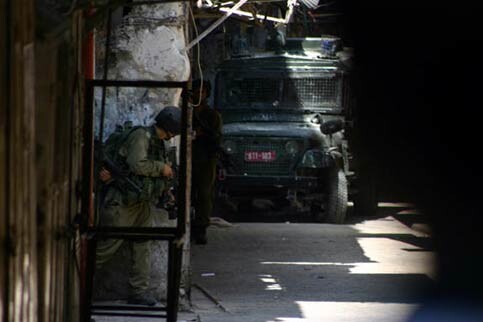
Soldiers carrying out house-to-house searches in Nablus’ Old City (Photo by Neil)
Interviewer: Was it a foreign photographer?
Israeli soldier: No, Arab. But yes, a journalist card. And we took his film. No one knew. No one…You have no inquiry after the mission, you don’t have…that was a time…like the Wild West. You could do whatever you wanted and no one asked you and no nothing.
Interviewer: And in that case, didn’t you tell the sergeant something like: “You know, this car… this is wrong…and…”?
Israeli soldier: No, I didn’t realize I was doing something wrong. I mean, you don’t have the awareness. I…I don’t know. It sounds stupid, but you don’t know how what you’re doing is bad. Only later, maybe after 2 years, maybe after you become a commander, and you become more balanced, grown up. You start realizing what you did there. I’m not saying I’m the one who…but I saw my friend putting them against the wall, and these are 30, 40 year olds, and not…I said ‘Wow!’ but I didn’t see the red light. I said, what a stinking reality this is and that’s it. Going around the city, doing nothing, yelling. And sometimes we would have with us a border police Sufa vehicle [Translator’s note: This is a blue armored vehicle]. Just like that. They would stop, see an open shop, and beat the hell out of everyone. Just placing them. It was amazing, I remember it. We stopped and stood in front of an open shop when there was still a curfew. The border police guys, right away the commander opens his door and puts everyone in a line, they all know very well how to stand. They say: “Why are you…” bang, bang, 2 slaps, go home, like that 11 people, 2 slaps in the face. I only learned from Y that it’s illegal to confiscate car keys from Palestinians.
Interviewer: Oh, you got that from Y? [Translator’s note: name omitted by request. Y is the one who has been organizing these interviews over the last few months]
Israeli soldier: Yes, because it’s something…When we were in Halamish [Translator’s Note: a settlement near Ramallah], it was the most natural thing to do. Just take the keys and drive away. It also happens in Nablus.
Interviewer: You took their car?
Israeli soldier: No, no. They stayed with their car there. Without the keys. Like in the city, in Nablus. You tell him: Why are you driving a car in the middle of the day?
Interviewer: This would happen during the patrol with the Hummer. OK, you arrive in the Hummer to the car and you tell the driver what?
Israeli soldier: This and that. Start yelling at him…After a few times we realized that they all have spare keys. So we would take the spare key as well. Leave him with his car, and drive away. “Come to the house in 2 days, to the checkpoint, and we’ll give you back the keys.”
Interviewer: Was it orderly?
Israeli soldier: What order?! Even if it were, it would still disappear…You change…
[…]
Israeli soldier: Yes. When we were in the abandoned house where people were not allowed to pass a car would pass - “Hopa! This! Why?” and you take his keys, the spare keys, “Go home on foot, your car is here, come back in 2 days.” You put the keys upstairs in the abandoned house, and the shift after us would also take their ID cards, take many.
Interviewer: And was it returned to them afterwards?
Israeli soldier: Many times it wasn’t. You suddenly see a Nargila in someone’s closet: “What, Benny, why do you have a Nargila in your closet?” He goes: “What, I didn’t know what to do with it…and this and this…” and I go: “Walla, I’ll take it” and he goes:” I don’t know if you’ll be happy about it, it’s a Nargillah from Balata” - “And why do you have a Nargillah from Balata in your closet?” - “We were once in an “Almanat Kash” procedure… and there was a house full of Nargilas so I took one.” So I told him: “I won’t take the Nargila, thanks.”
ACTIVE DUTY (DECEMBER 2003 TO MAY 2004) - X MARKS THE COMPANY KILLS
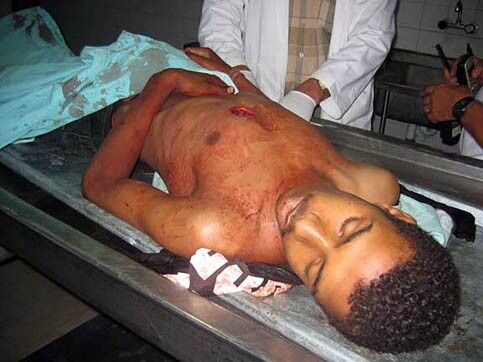
Civilian Yasser Tantawi (17), killed by IDF snipers in Balata camp in July (Photo by Phil)
Interviewer: Your company was on active duty. When was that?
Israeli soldier: It was between December 2003 and May 2004. Now, until 6 weeks ago.
Interviewer: And did this happen inside Nablus too?
Israeli soldier: No. Our headquarters were at the regional brigade, and we would enter the city for ambushes every time.
Interviewer: When you say “every time” you mean…
Israeli soldier: Something like 4-5 times a week. Arrests, “Almanat Kash” procedures, “Livnat Shibush” procedures.
Interviewer: How many X’s does the company have? [Translator’s note: Xs are marks employed by IDF soldiers to denote kills].
Israeli soldier: Hmm…we have 11 armed, I think. And something like 4, 5 kids.
Interviewer: 4, 5 kids?
Israeli soldier: To the extent that at some point they told us that since we took down only 4 kids, they give our company tasks because we are known as a company that doesn’t hit innocent civilians.
Interviewer: Who told you that?
Israeli soldier: The company commander said it was the brigade commander. We get tasks because we know how to be selective and we don’t hit the innocent.
Interviewer: But these are just 4 kids…
Israeli soldier: Just 4 kids…
Interviewer: And these 4 kids were killed when?
Israeli soldier: Between December and May [2004].
Interviewer: Between December and May - 4 kids.
Israeli soldier: It’s a company of 60 people that know how to distinguish…there was an operation, “Mei Menuhot” [Translator’s note: Operation Calm Waters, which lasted from the last few weeks of December 2003 to the beginning of January 2004] it lasted 2 and a half weeks, all the brigade entered Balata. Each time for a few days. Going in, going out. I think that just there, as part of the brigade, the paratroopers, we took down a lot of civilians. We got newspapers every time and I would see that an old man was killed. We were not aware of this. They didn’t tell us that the nearby force took someone down. “An old man and 4 children were killed in Balata because they entered a battle zone.” Now, you are there, you know what a battle zone is.
Interviewer: What is a battle zone?
Israeli soldier: I don’t know. The papers say Balata is a battle zone. There weren’t too many shooting incidents there. But this is a battle zone…I don’t know…soldiers shoot so it becomes a battle zone…but there were a few operations this year of entering Balata at daytime to the market alleys, in order to take out armed guys. That’s the aim. We once had a mock arrest in a shop in the market. Just entering the shop. Just the one looking the most convenient. At the same time snipers enter the houses nearby and we stay there for 40 minutes inside the shop like assholes, hoping that no one will shoot us in the middle of Balata. It’s a very…refugee camp…a deputy paratrooper company commander was killed there a month ago…so we’re in the same alley, hoping our snipers take them down before…
HOUSE OCCUPATIONS, MOCK ARRESTS
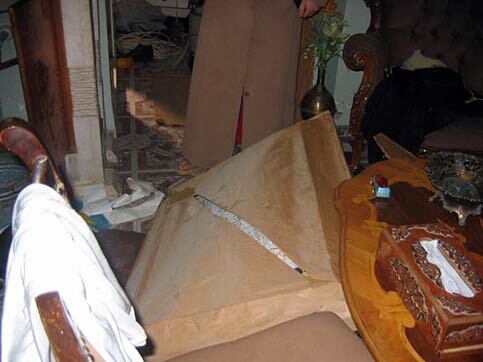
Aftermath of IDF house-incursion, with slashed furniture visible. (Photo by Phil)
Interviewer: Just a minute, is there a reason for doing this?
Israeli soldier: I don’t know. There’s no intelligence or something. It’s just something that the company commander chose.
Interviewer: What, during movement?
Israeli soldier: No, no, no. It’s a battle procedure of three days. You look at the aerial photos, you say “If I choose this shop, then this is the house where I will put him,” and, sort of strategically, this shop is the most convenient. It has the best entrance, it has the best escape exit.
Interviewer: And the curfew is open or not?
Israeli soldier: What, there’s no curfew in the city.
Interviewer: There are people in the alley.
Israeli soldier: Full of people everywhere. That’s the aim. The market alleys, in midday are full of people. Like any market…
Interviewer: And you go in.
Israeli soldier: We go in with stun grenades, shooting in the air. A shop is something this size [motioning with his hands], with the entire wall exposed to the street. A door here, a door there and all of it exposed to the street. And as soon as we enter, people start running away.
Interviewer: What’s the point?
Israeli soldier: Make the gunmen come, and let the guys bring them down before they hit us. We’re the ducks.
Interviewer: OK, so what do you do in the meantime?
Israeli soldier: Nothing, inside the shop, try to find shelter. In case they come to the alley in front of us and…
Interviewer: Scary?
Israeli soldier: Yes.
Interviewer: How long?
Israeli soldier: 40 minutes. The aim is to make it look like an arrest all the way. So that they won’t get the method. So you also arrest a guy. Arrest a guy inside the shop, run him through all the process of…take him to the detention center with his eyes covered, to the regional brigade headquarters, they will interrogate him and release him at the end of the process. Let them think it was a real arrest and we just got the wrong man. And there was a case when we went in once and the shop was empty and another time there were three people there, one 70 years old, one 50, and a 60 year old woman.
Interviewer: You had no one to detain, just…
Israeli soldier: Yes, but it did not prevent the platoon commander from blindfolding and handcuffing the 70 year old and taking him.
Interviewer: And detain him and…
Israeli soldier: Yes, but we didn’t take him, we realized it was unnecessary. But what we did was to send him to open the house for us.
USE OF HUMAN SHIELDS
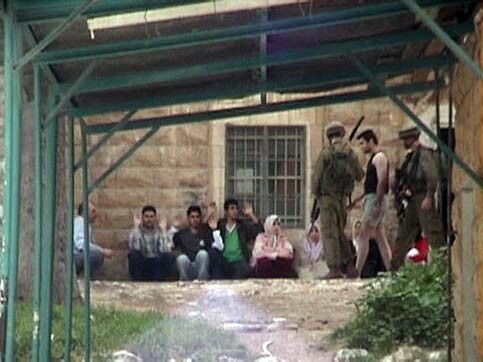
IDF using human shields at a student housing complex in Nablus, April 2004 (Photo by Kole)
Interviewer: I don’t understand.
Israeli soldier: They say the procedure of “Nohal Shahen” [Translator’s note: Using Palestinian civilians as “Human Shields”] is no longer legitimate. So you don’t call it by this name. You call it “Mevi Haver” or something like that. It has a name…
Interviewer: What does it mean?
Israeli soldier: It means that if I go to arrest someone and I know the guy is dangerous, he’s armed and all that, then there’s nothing to prevent me from going to his neighbour, and I go in and I don’t know exactly where the location is - I have 5 houses, let’s say in the Kasba or in Balata. Intelligence says that the guy is supposed to be in this block. So I knock on the door: Which family is this? OK, that’s not the one. “Ok, you come with me”. Make him knock and bring everyone out.
Interviewer: So now he goes around the place - knocking on door after door ?…
Israeli soldier: No, he goes to one house and then we’ll take someone else from the other house.
Interviewer: And when he goes, where are you?
Israeli soldier: A bit behind him. He goes first.
Interviewer: You aim your weapon at him?
Israeli soldier: No. He goes first and you aim, but not specifically at him. He realizes he has nowhere to run. He knocks on the door: “Ya zalame…” [Arabic for “Hey man…”]. He summons them.
Interviewer: What…this is happening now?
Israeli soldier: Yes, it’s a well known arrest procedure in the case of…
Interviewer: When was the last time you did this?
Israeli soldier: April…I don’t remember exactly.
Interviewer: Did it seem strange to you when you did this?
Israeli soldier: It’s obvious to me that this is wrong, but not strange. This is something that happens all the time. A well known procedure.
“THEY TOOK PHOTOS LIKE 20 YEAR OLDS IN A NORMAL WORLD DO”
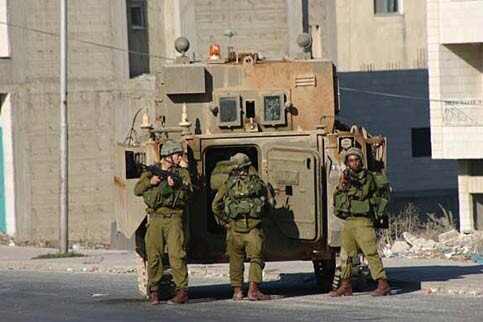
Young IDF recruits during an operation in Askar Refugee Camp, Nablus (Photo by Neil)
Israeli soldier: On our last active service term, we had an arrest where the guy tried to escape. They saw a weapon on him. They killed him. He took one leg and an Uzi out…tried to jump. They shot his leg, he fell and died of blood loss. We pressure cooked the house, because there was another one inside. There are photographs in the company that… Not anymore, because the guys have been discharged by now…
Interviewer: What kind of photos?
Israeli soldier: Of people with a V sign over his head, they don’t touch the corpse….There was no mutilation…but they took photos like 20 year olds in a normal world do.
Interviewer: What did they tell you after you had killed him?
Israeli soldier: Nothing. What, that they took photos? Nothing.
Interviewer: Did the company commander also participate in this?
Israeli soldier: I don’t know, but it’s not impossible.
Interviewer: Does he know they took photos?
Israeli soldier: Yes, yes, sure.
Interviewer: Didn’t say anything?
Israeli soldier: Nothing
Interviewer: You were the company commander’s communication operator.
Israeli soldier: Now. Started doing this 2 weeks ago.
Interviewer: I see.
Israeli soldier: But I happened to be at the front operations command [Translator’s note: Hapa’k in Hebrew] a few times.
FRONT OPERATIONS COMMAND, TAKING OUT KNEES
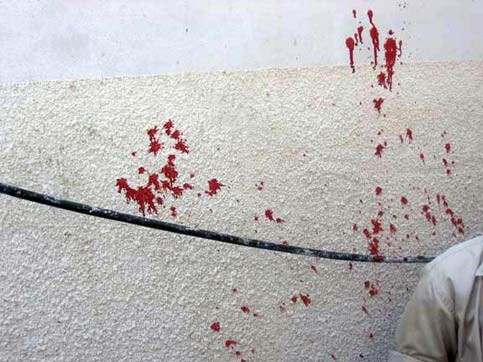
Blood stains left behind on an alley-wall in the Balata refugee camp by boy who’s arm was shot off by IDF snipers (Photo by Phil)
Interviewer: And how do you find the attitude there?
Israeli soldier: Quite often childish…stone throwing…kids…so shoot at the wall next to them. Live bullets.
Interviewer: How many metres from him? 5 metres, let’s say?
Israeli soldier: 5 meters is an overestimate.
Interviewer: Overestimate, you say? And who shoots, the company commander?
Israeli soldier: Yes, we drive around with the front operations command, they are dismantling us with stones…Always with a brick, we and a Hummer vehicle or another Sufa vehicle is 2 vehicles at the minimum. It’s usually 4 vehicles.
Interviewer: So you started saying that the company commander goes in - they throw stones…
Israeli soldier: So he’s authorized to shoot at the wall near them. Not to shoot at the legs…
Interviewer: Did he ever hit someone?
Israeli soldier: Not that I know. I have lots of stories about kids’ legs and knees that he took out, but according to martial law.
Interviewer: What do you mean?
Israeli soldier: Kids throwing Molotov Cocktails, throwing this…You take out their legs.
Interviewer: So there are Xs on the weapon?
Israeli soldier: No, they weren’t killed, I think. Just took out their knees.
Interviewer: Is that how you call it?
Israeli soldier: Not necessarily…but people talk: “Ahmm, yes, I was in Beit Surik and I took out at least 5 knees there”. You often feel that people treat this loss more like a game. Because you are sitting inside a shielded Abir vehicle and nothing can happen to you, so you laugh at the stones and Molotov cocktails thrown at you, and then you shoot gas at them and throw stun grenades at them. It’s a kind of Hasta La Vista thing…So you start to spray with it. Gas inside shops…
Interviewer: Do you feel that the company commander incites the guys or cools them down?
Israeli soldier: No, he cools them down. Yes, in this respect he says before every entry…I’m not sure that for the right reasons: “Guys’ don’t hit civilians…look, they think we’re not a company that hits civilians. We get the good operations.” That’s his reason no to hit civilians.
Interviewer: Yes? That’s the way he presents it?
Israeli soldier: Maybe there’s another reason, but think about it before any time you shoot. Because again, this operation that we’re entering the city in midday into shops and all that…so there are many innocent civilians. So he says: “I’d rather have one gunman escape than one innocent person hurt.” He says this to get more operations like this. Because otherwise they won’t let us do this operation next time. I’m not sure it’s for the right considerations. He specifically, I know that he is… He is aware of this issue.
Interviewer: What do the guys infer?
Israeli soldier: I don’t think they hit on purpose…
Interviewer: Surely not on purpose. But you said about the kids killed during this year and a half, do you know specific people who hit? The guys talk about it? I know I shot a kid today?
Israeli soldier: Yes, sure.
PROVING YOURSELF IN THE IDF
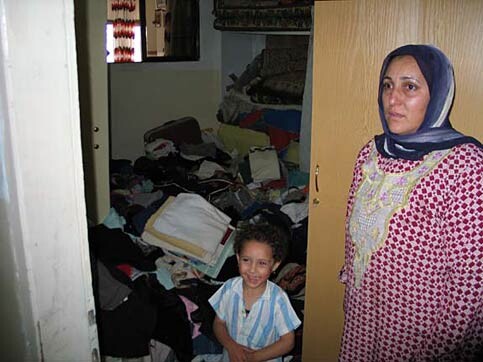
Palestinian families in Nablus continue to suffer from the daily terror inflicted on them by IDF forces operating in the city and the surrounding camps (Photo by Giampiero)
Interviewer: And how do they speak about it?
Israeli soldier: Some take it like this and some like that. There are people who…OK, I killed a kid, OK. They laugh. Yes, now I can draw a balloon on my weapon. A balloon instead of an X. Or a smiley. Some people take it hard. I remember that during squad commander training I was in Jenin, let’s say, we were in an “Almanat Kash” procedure, and everyone who climbs on Israeli APC’s or armoured vehicles - shoot to kill. And the aim of all this was to have people climb. Because you have APC’s under the house all the time. They tell us of course that the aim is to make the wanted men come out. But what wanted man would shoot just like that at an APC?
They also say that if they jump on the APC and take the machine guns…shoot to kill. And then a friend of mine came with his M29, sniper’s weapon, and a kid just climbed. He shot, all happy - I took someone down. And then they told him he took down an 11 year old kid or something like that. He took it very hard.
Interviewer: Killed someone, so he was happy. Why?
Israeli soldier: Yes, because you prove yourself. You’re a man.
Interviewer: It is known he is unarmed.
Israeli soldier: He’s unarmed for sure and he climbs it…No one asks you why you have 2 X’s on your weapon and if they were armed and this was done by procedure. It can be two Molotov throwers and it’s still 2 X’s.
[ends]
Kole, who edited the English translation of this article, has an MA in Political Science and International Relations and has been admited to Cambridge University for a PhD investigating the contestation between hegemons and subaltern actors within the realm of civil society. Since December 2003 Kole hass been working with the International Solidarity Movement (ISM) in Nablus. He also maintains the Into the Middle East Blog, which can be found at: http://intothemiddleeast.civiblog.org/blog.

